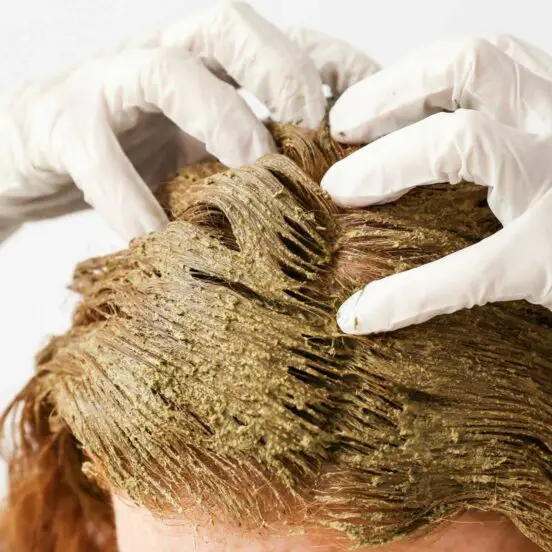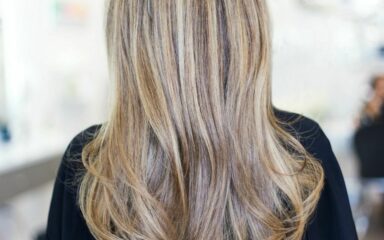Henna is often touted as a natural alternative to chemical hair dyes, and it has been used throughout history to color hair and skin in India, Pakistan, Africa, and the Middle East. Dying your hair with henna can work great, as long as you are aware of two things: the range of colors is mostly limited to reds, browns, and black... and it's very difficult to remove henna from hair.
What Is Henna?
Henna powder is made from the leaves of the Henna tree, scientifically known as Lawsonia inermis. This is a small tree with small leaves that when crushed release a substance, lawsone, which stains skin, hair and other porous materials.
Many Asian, African, and middle eastern people still use Henna to this day to create temporary body art and to color their hair beautiful shades of red, and the practice has reached people concerned about how to naturally dye their hair. Henna is also very popular among people allergic to synthetic hair dyes, but be careful if you are buying to avoid mixtures that use other chemicals besides the plant powder.
Henna acts as a conditioner and doesn't damage your hair, and can cover greys quite effectively (though they will become bright red, like highlights).
How Long Does Henna Last in Hair?
Unlike your usual chemical dyes, henna doesn't need to open the cuticles to deposit color molecules inside the hair. Henna stains the hair cuticle itself, which makes it a very long-lasting type of hair dye. In fact, if you have been dying your hair with henna for a while, the cumulative staining and color depositing can be very difficult to shift.
Overall, henna hair color remains rich and vibrant for over a month, easily six weeks.
How Long Does It Take for Henna to Come Off Hair?
Strictly speaking, henna doesn't come off hair. It will become more and more muted with time, but your hair will permanently have a reddish tone, and it won't lighten up naturally. As it stains the hair cuticle, the end results of chemically dying hair that has been treated with henna can be quite unpredictable (so do tell your hairdresser!).
Is It Possible to Remove Henna from My Hair?
Sadly, it is nearly impossible to remove henna from hair fully. However, the color can be lightened and toned. But you will still have hair that is some shade of red or ginger, depending on your base color and how long you have been using henna on your hair.
You can use bleach to remove the henna, but only after the henna has faded a lot. The following methods will help you achieve that, but if you want to go blonde you will need a hair lightener afterwards. Resist the temptation to use bleach on hair that still looks brightly henna colored, as opening the cuticles means the staining can become even more entrenched on your hair.
Can I Apply Hair Dye Over Henna?
If you apply a synthetic hair dye over henna-treated hair you can end up with unpredictable results. Even worse, if the henna had metal salts on it (a common additive) there will be a chemical reaction that will generate a lot of heat and burn your hair and scalp. Bleaching henna hair before fading it can have a very similar result.
Requirements for Coloring Over Henna Or Bleaching Henna Hair
So coloring over henna or bleaching henna hair is not a good idea, at least until:
- The henna has faded enough that you won't be making it worse by pushing it into the hair
- The metal salts have been washed off by using alcohol to remove henna from hair
The following methods to fade henna from hair will help with both things.
Removing Henna From Hair With Oils Has The Best Results
One of the most pleasant ways to remove henna from hair is by using hot oil treatments overnight regularly. This will help pull the pigment and repair damaged hair. And who doesn't like a bit of pampering? But if you want to get rid of henna from your hair fast, you will need to do a proper oil soak.
Start by making sure you have access to a lot of oil. You will need to soak your hair, so a cheap oil such as olive, coconut or rapeseed oil can be used as a base. Some people like using argan oil as well, but you will need a lot unless your hair is short.
Mineral oil can be used as well, but it won't have the conditioning effects of vegetal oils.
Start by heating up the oil slightly, and then soak your hair until it's dripping in oil. This is not your usual hot oil treatment, this is henna removal, and as such, you need to really soak your hair. Then cover your hair with a shower cap or cling film, which will keep the heat in. If you can, use a hair dryer or sit in the sun so the oil heats up. You should leave it there for at least 2 or 3 hours, more if possible. Ideally, and this can be messy, sleep with your hair soaked in oil. This will give the treatment 12 hours to do its best to remove henna from hair.
When it's time to rinse, use a clarifying shampoo or an anti-dandruff shampoo. You want the kind of shampoo hairdressers warn you against when they color your hair. The harsh, stripping kind. Head&Shoulders for example. Use hot water, and wash your hair several times until all the oil is gone. If you sleep with your oil hair, it will take several washes to get it all out of your hair, but it will fade the henna significantly.
Repeat this process once a week until the henna has faded enough.
Using Vodka To Remove Henna
One of the problems with henna is that sometimes metallic salts are present in the mixture. This poses a risk when you want to chemically color over henna, because synthetic dyes, plus metallic salts, can cause a heat-producing chemical reaction that will literally burn your hair.
Using a high-volume spirit such as vodka can help neutralize those salts and make your hair safe for re-coloring (but a strand test is nearly mandatory here, you never know with henna, and you don't want to burn your hair or your head). It can also be used to make the hot oil treatment more effective.
Start by washing your hair twice with a clarifying shampoo. Using a sponge or a spray bottle, apply vodka to your hair until it's fully soaked. Open a window; the smell is going to be terrible! Leave it on your hair for 15 to 30 minutes, and then wash it off with a shampoo for hard water. This will remove metallic salts and mineral buildup from your hair.
Remove Henna From Hair With Lemon Juice
Lemon juice can be used to lighten hair naturally, which can help tone down henna that is too dark or too bright into a more natural color.
Using lemon juice to remove henna from hair is quite strong and can leave your hair feeling dry and brittle. Think of it as a natural bleach. The best way to remove henna from hair with lemon juice squeezed from actual lemons.
Wash your hair with a clarifying shampoo, and then soak your hair in lemon juice, ensuring everything is covered. Leave it for up to three hours (do not sleep on it) and stay out of the sun as the lemon can make your scalp photosensitive. This should lighten your hair significantly.
Wash off your hair with clarifying shampoo again and then apply a deep conditioning mask to restore moisture to your hair.
Use Raw Honey To Remove Henna From Hair
Raw honey can be used in a similar way to lemon juice to clarify and lighten hair. It is less effective, but it will also not leave your hair as dry as lemon juice and won't have any negative interaction with sunlight. However, if you try gardening while your head is covered in honey you will get the attention of the many bugs and bees in your garden. Don't ask how I know.
How to remove henna from hair using honey? It's quite straightforward but a bit sticky. Wash your hair with a clarifying shampoo, then apply honey to cover your henna dyed strands and leave it be for 3 hours. Afterwards, wash your hair on hot water until the honey is not sticky anymore, then use a clarifying shampoo once more to wash it off your hair.
Try Using Whitening Toothpaste To Remove Henna From Hair
Whitening toothpaste is a very messy way to remove color from hair, and it can be used to remove henna as well. This works better when you want to remove henna from around your hair (if henna has stained your skin) and it's not practical to do all over your head.
Just use whitening toothpaste with your finger and rub it over the henna-dyed areas, leave it for 15 minutes and wash it off. The slightly bleaching effect combined with physical exfoliation should remove henna stains from around your hair easily.
Do A Salt Water Soak To Gently Remove Henna From Hair
If you want to fade henna that is already on its way out, you can use epsom salts mixed with water. Make a thin paste, and apply it to your hair, leaving it for 20 minutes. It doesn't work as well as a hot oil treatment, but it will exfoliate your scalp and help remove henna from your hair without damage.
Does Vitamin C Remove Henna from Hair?
Vitamin C can be used to remove demi and semi-permanent dye from hair, and it can also be used to fade henna in a very similar fashion. It is however not nearly as efficient against henna as against synthetic dyes, because henna actually stains the hair cuticle more than synthetic dyes. But it's worth a try if you want to get rid of henna on your hair quickly.
Crush some vitamin C tablets and mix the resulting powder with anti-dandruff shampoo. Wash your hair with this mixture, leaving it to act for 10 minutes before rinsing it off.
How Do You Remove Henna from Grey Hair?
Henna can go a very bright red on grey hair, which can be unexpected and not to everybody's taste. The best way to remove henna from grey hair is by using the oil pulling method. There are two reasons for this:
- Grey hair is more coarse, and lacks moisture. You want to use the less agressive method you can to avoid ending up with wiry hair.
- The oil pulling method is slow but the most effective way to remove henna from hair.
If you want to avoid very bright red hair, choose a henna that has indigo mixed in which will give you a more brown or auburn tone.
How Do I Lighten My Hair After Henna?
Once the henna in your hair has been faded as much as possible, you can try to bleach it to lighten it up back to blonde. It is very important that you remove any potential metal salts by using the alcohol method when fading henna from your hair. Otherwise, your hair may burn, and at the very least it will get very hot and uncomfortable.
You can bleach your hair at home after henna, exactly the same way you would normally do. However, there are a couple of things to keep in mind:
- Do a strand test. Do a strand test. Do a strand test. Hair that has been dying with henna can lift very unpredictably.
- Use a lower volume developer than usual, so you get a slower and more controlled lift.
- Carefully control the lifting time, giving your ends considerably more time than your roots and middle section.
Henna works accumulatively, so if you have been dying your hair with henna for a while your ends will have significantly more henna than your roots. That means you can't just bleach all your hair at the same time and hope you will get an even result. Think of it as a color correction for permanent dye. In fact, henna is as difficult to remove as black hair dye, and many hairdressers will recommend you get a haircut.
If you are reading this before using henna to dye your hair, please consider how difficult it is to remove henna from hair before you commit. There is nothing wrong with henna, people use it to get beautiful hair without the harsh regrowth line and synthetic dyes. But it's a long-term commitment, and if you love changing your hair color or feel like you'll miss your blonde you should choose another hair dye option.



